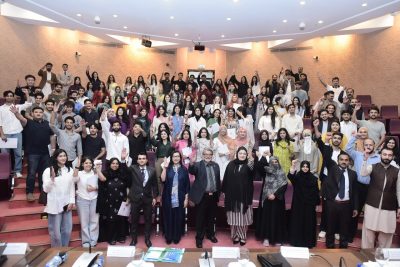
The Pakistan Institute for Parliamentary Services (PIPS) organized a seminar on “Constitution, Parliament and Public Policy Research” with 104 participants comprising 03 faculty members and 97 students of the BS Public Administration at the National University of Sciences and Technology (NUST), Islamabad. Ms. Fakiha Mahmood, Deputy Director (Research) moderated the day long interactive sessions as part of Parliamentary Studies Initiative of the National Parliament.
Mr. Muhammad Rashid Mafzool Zaka, Director General (Research), PIPS, delivered an interactive first session on overview of the constitutional underpinnings of Pakistan’s parliamentary democracy, highlighting the crucial role that Parliament plays in public representation, government accountability, and lawmaking as well as scrutiny of the executive. According to him, the Constitution is a living social compact that preserves democratic and Islamic values while defending the rights, equality, and freedoms of all citizens.
While describing the process of policy research, he underscored that successful policymaking involves problem-solving, consultation with stakeholders, formulating policy, cabinet approval, whereas the Parliament has the authority to scrutinize every step of public policy prepared by the government. He emphasized that rigorous research provides informed decision-making and better governance. Mr. Zaka also spoke about the role of Parliament in scrutiny of policies, budgets, and administrative actions through expert hearings and evidence-based analysis in addition to three levels of policy making from Direction, Strategic Plan and Operational level of implementation of any public policy. He shared that Parliamentary public policy researcher applies the good governance model to see if a public policy fulfills the parameters of: participation, consensus making, rule of law, transparency, accountability, responsiveness, effectiveness and efficiency. PIPS DG (Research) also spoke about the importance of research triangulation multiple sources and viewpoints to get credible analysis.
In the second session, Mr. Abdul Nabi Solangi, Deputy Director (Legislation) PIPS, presented an overview session on the legislative process and defined law as a system of rules made and enforced by the state in order to regulate behavior and preserve order. He described Pakistan’s legislative framework, which includes the President, National Assembly, Senate, Provincial Assemblies, and the legislative assemblies of Azad Jammu and Kashmir and Gilgit-Baltistan. Mr. Solangi explained principal and subordinate legislation, pointing out that Ordinances are published under Articles 89 and 128 of the Constitution and are temporary legislation issued in case of Assemblies being not in session. He outlined the process of lawmaking from bill introduction and committee examination to enactment and presidential approval, after which it becomes an Act of Parliament. Stressing that legislative affairs are guided by Articles 70–76 of the Constitution and Rules of Procedure of both Houses, he concluded that an understanding of the legislative process is essential for consolidating democracy and encouraging intelligent public involvement in government.
In the final session, Honorable Ms. Shaista Khan, Member of the National Assembly of Pakistan as a chief guest spoke about the significance of parliamentary committees for effective oversight of government. She apprised the participants about the working of the committees, their composition and how they have led to rigorous accountability mechanism. She also recognized the role of youth in making this oversight process more productive. She suggested that youth should also be allowed to partake in committee meetings and their input be incorporated. Hon Dr Shaista Khan, Member YPF also eulogized the imperative role of a bridge-building between Parliament and Youth performed by the Pakistan Institute for Parliamentary Services, which is doing a wonderful work way in promoting the values of democratic accountability and dialogue across the country.
In an elaborated Q and A session, the panelists replied to numerous questions on continuity of government policies due to disruption in democracy, parliamentary authority to question executive, consensus building and unity of diversity as depicted in the Parliament, responsibility of people in freedom of speech and duty of state to give minority rights, responsiveness of Parliament to meet emergency challenges, climate change and challenge of fundamental rights of clean air, issue of mainstreaming of smaller provinces, and parliamentary forums to create policy review for providing appropriate redressal of public policy problems.
Mr. Ahsan Manager and Ms Asma Mohsin faculty Member NUST presented vote of thanks to Hon MNA and team PIPS. NUST faculty and students acknowledged the session as very interactive and productive with regards to public policy research as well as working of the Parliament, legislative process and committee effectiveness. Ms Asma Mohsin and NUST alumni extended gratitude to Hon MNA and Team PIPS for such enlightening session inviting them for a similar session at the NUST campus.
DG R presented PIPS mementoes to HON MNA Ms. Shaista Khan while Ms Fakiha Mahmood present memento to faculty NUST Ms. Asma Mohsin and Mr. Ahsan. PIPS sets of publications were also presented to faculty members and students of NUST before the proceedings concluded with Quaid e Azam Muhammad Ali Jinnah’s quote: “I will urge you to strive, and work, work and only work for satisfaction with humility and patience and serve thy nation,” read by all and sundry in one voice before the slogan PAKISTAN ZINDABAD!